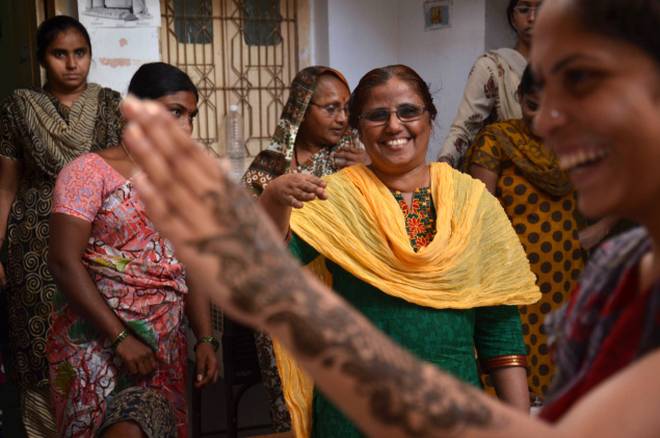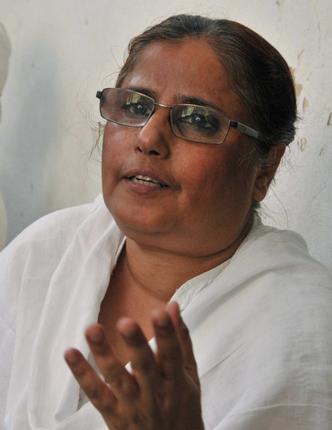It’s not easy giving up a secure job to work for women’s rights in an area where domestic violence and discrimination is the accepted norm. But if you dream about change and a world of equality, like poet and activist Jameela Nishat did, the transition is not hard at all.
Originally a teacher at a school for special children with a regular pay package, Jameela decided to give it all up to live for her conviction. What followed was a tumultuous journey filled with hostility, social boycott and accusations. But one thing remained constant – Jameela’s patience and perseverance. Today, not only is she well respected, she is also the person most women in Old City turn to for help.
Over the years Jameela has managed to help several women who have been victims of domestic violence, sexual abuse, incest, polygamy and forced marriages to much older men through her organisation Shaheen.
The journey was never smooth though. When she first began her journey as a women’s rights activist, Jameela was met with stiff opposition by not just the men in the locality but even the women.
“Domestic violence was a way of life for these women. I was met with statements like Woh mard hi kya jo aurat ko na maare (what kind of a man doesn’t beat women). When I set up Shaheen in this locality of Sultan Shahi not too many people were open to change. It is only over time that women have begun to realise that they too have a choice,” says Jameela, who is also an executive member of Asmita Resource Centre for Women. On several occasions Jameela and her team have busted fake marriage attempts by Arab men with young city girls.
It took tremendous tact and patience on her part to get her point across. “When I first began coming to this place, I approached the girls saying I could help them with English. Being summer vacations more than 50 girls came forward to learn the language. Gradually a month later I broached the topic of sexuality. Instantly 50 girls stopped coming and I was left with just five who were willing to work with me to create awareness. That is how Shaheen began,” she explains.
Needless to say, there was a lot of resistance. “I remember one particular incident when I was surrounded by more than 25 men, who did not agree with my work. This happened after the 2003 riots in Old City. I decided to hold a workshop for the Muslim, Dalit and BC boys on communal harmony. When our staffers and other girls sat alongside them for the workshop, the boys were livid. They were worried the girls would elope with Dalit boys,” she says.
But the transformation did come about. Slowly women began approaching Jameela for help and numerous cases of domestic violence and incest came to light. “There have been cases of women seeking a divorce after tolerating violence for 25 years. They are slowly beginning to realise that abuse is not a way of life. Most heartrending are the cases of incest. We once had a seven-year-old girl tell us that her 12-year-old sister was covered in cigarette burns by their step-father. When we met the girl we learnt that the man had been sexually abusing her. In another case a mentally unstable girl had been violated for several years by a maulvi under the pretext of treating her. We intervene and try to rehabilitate these girls. But resistance still persists in some people,” says Jameela, recalling an incident where a young woman was tied to the cot and set ablaze by her husband. Yet nobody from the girl’s family wanted to press charges. The girl herself told the police that it was just an accident.
For Jameela these are not mere cases. “I live these cases myself. Victims don’t need our sympathy, they need empathy. And that is what I do,” she says. Quiz her on how her family reacts to her work and she says, “I come from a very cosmopolitan family. My father was a painter and I’m a poet. My husband is an atheist and does not believe in these practices. We are like friends living under one roof. My sons also understand and appreciate what I do. As such I do not discuss my work with my family. My siblings know about what I do through newspaper articles.”
Her true dream though was to become an artist. “However, my father was sceptical about me going to art school since we would have to paint nude models. However, writing was encouraged in Muslim households, so I took to poetry,” she says, adding that she spent her childhood watching M.F. Husain paint on their living room floor. “He was my father’s close friend. He would roll out a canvas on our living room floor, sit on it and create a masterpiece in no time. Sometimes he would just use his hands to spread the colour. I would watch him and paint some pieces myself and pass it off as my brother’s work,” she laughs.
Through all of this, Jameela’s poetry is her constant solace. “I begin my mornings by writing a couplet. I write about the incidents I come across. It helps to channel my feelings through words,” she says, sharing a couplet she recently penned, which she says aptly describes her life.
Iss zindagi ki raah mein
Aese nikal padi
Meri talab sab ko hai,
Mera hisab kucch nahi
source: http://www.thehindu.com / The Hindu / Home> Society / by Ranjani Rajendra / Hyderabad – September 26th, 2013












